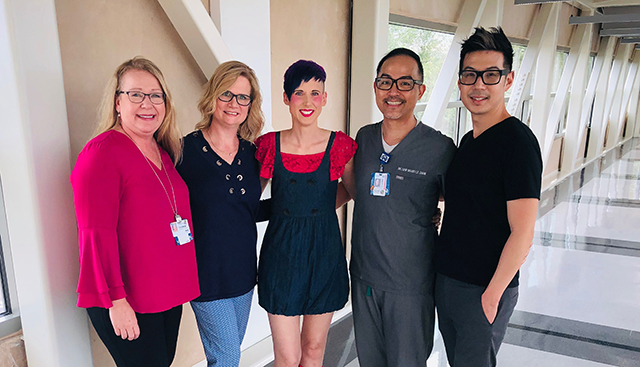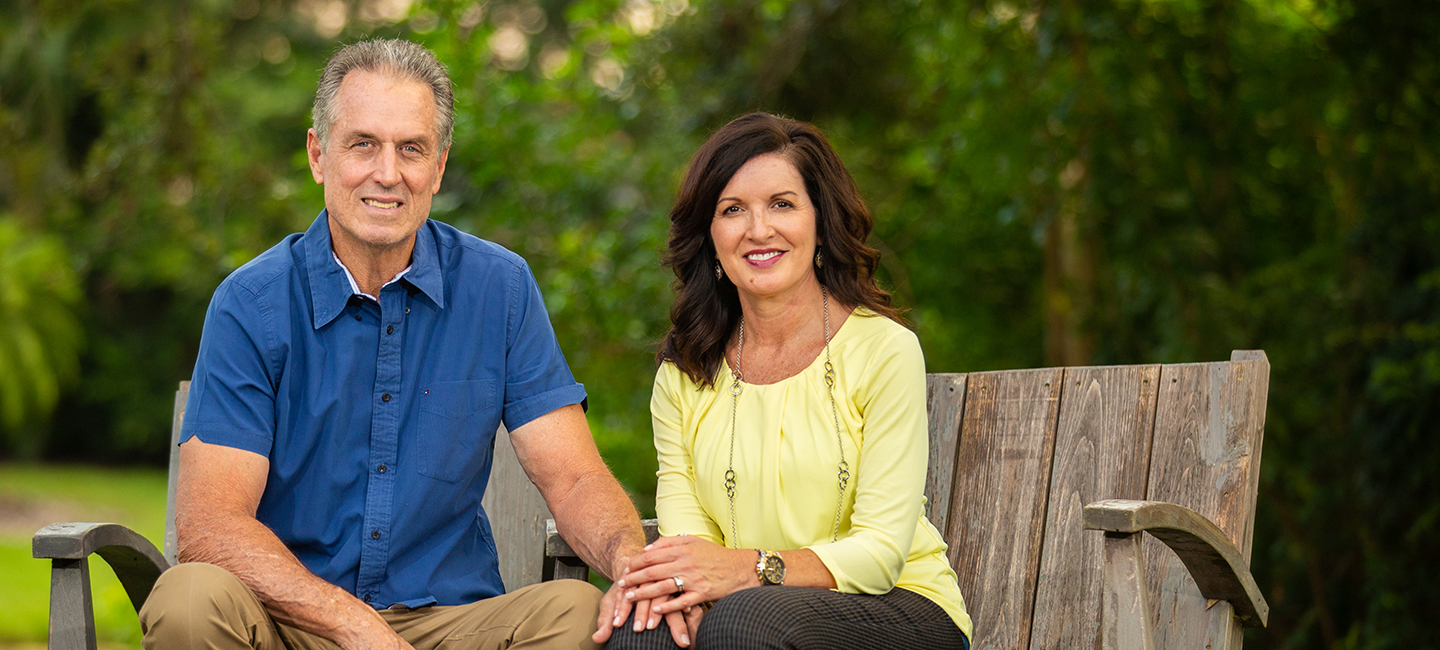United Against a Common Enemy
NOTHING UNITES LIKE A COMMON ENEMY.
Just ask participants in a tour of the Moffitt Cancer Center research lab run by Karen Mann, PhD, assistant member of the Department of Molecular Oncology. “Our focus in my lab is specifically to identify how pancreatic cancers become so aggressive,” Mann explains.
Her tour guests have been living with it. Greg Feldman is a pancreatic cancer survivor. His wife, Melissa Seixas, has been his primary caregiver throughout the seven-year battle. “When I tell people my husband was diagnosed with pancreatic cancer,” she tells the lab personnel, “they assume I’m a widow. I have to jump in and say no, he’s fine! He’s been treated at Moffitt.
“I spent many hours here at Moffitt, but never on the research side,” says Seixas. “You’re kind of like the wizards behind the curtain, working to find treatments and cures.”
The couple came here for hope; to learn more about what Moffitt researchers are doing to advance the understanding, diagnosis and treatment of their common enemy. But their presence has a definite impact on those who work here. “That’s the motivation that gets us going every day,” says postdoctoral fellow Suman Govindaraju as he takes a moment from his work at the lab bench.
PATIENT EMOTION BECOMES RESEARCHERS’ FUEL
The tour is part of a new program called the Patient Researcher Forum. It was the brainchild of another Moffitt researcher, Eric Lau, PhD. An assistant member in the Department of Tumor Biology, Lau and his research team center their work on melanoma and breast cancer. He was introduced to a young melanoma patient by his partner, acupuncturist Dr. Liem Le, and offered to show her the research work being done on her type of cancer in his lab. “We thought this would be an opportunity for my trainees to break down in layman’s terms what it is that they do,” says Lau. “But she turned the tables on us.
“For almost 20 minutes in my lab, she basically told us about everything in her life; from the day she woke up feeling sick to her diagnosis with metastatic cancer in the brain that same week. And it was very emotional, for the patient and for us. We provided an emotional reception that was very different from what she had experienced.”
The emotional release that proved helpful for this young patient became fuel for Lau’s research team. “It really motivated and brought a new perspective for everyone in the lab. That change in energy and the way people approached their work was very tangible.”
But beyond the benefits to young researchers, Lau says, “It is our social obligation to report back to the people who we serve, and those are the patients. And honestly, I don’t think there’s enough of an opportunity to do that.”
It was clear to Lau and Le that this experience and perspective needed to be shared with as many researchers as possible. Over the next few months, Lau and Le worked with Anne Bidelman, who manages Moffitt’s Patient and Family Advisory Program, and her predecessor in that role, Kim Amtmann-Buettner. Together, they designed a two-hour experience to replicate that original exchange between patient and researchers. Every month since July 2018, they have been identifying and recruiting patients who would be willing to share their experiences with lab personnel.
Lau says that he and most of his colleagues got into cancer research “because we were gung-ho about doing something to make a difference for cancer patients. But I can remember very clearly back when I was a grad student working in a lab. I reached a sort of mid-grad career crisis, wondering what on earth I was doing. I was under such pressure to write my thesis and ace whatever exam was on the horizon. You kind of lose focus and perspective of why you started this journey in the first place. And I think this kind of forum is really helpful in reminding — especially the younger trainees — why it is that they’re doing this and what they should be aiming for.”

WHERE IT ALL STARTED – Patient Danielle DeCleene (center) was the first to share her story and inspire Moffitt researchers in an informal visit to the lab of Dr. Eric Lau (far right). Danielle was being treated by acupuncturist Dr. Liem Le (second from right) for pain related to her melanoma and expressed interest in learning about Moffitt’s melanoma research. Le arranged her visit to husband Lau’s lab, and the resulting emotional exchange became the basis for monthly Patient Researcher Forums. Moffitt’s Patient and Family Advisory Program Manager Anne Bidelman (far left), and her predecessor in that role, Kim Amtmann-Buettner (second from left), help to identify and connect patients to participate in the forums.
CLINICAL CRASH COURSE
It’s also an opportunity for the researchers to gain a greater understanding of the clinical side of whatever type of cancer the tour patient is facing. While the patient and their guests tour the lab, forum researcher participants hear from a Moffitt physician who specializes in the diagnosis with a clinical “crash course.”
In Feldman’s case, his surgeon Pamela Hodul painted a bleak picture. The American Cancer Society estimates over 56,000 Americans will be diagnosed with pancreatic cancer in 2019 and, Hodul added, almost all will die from the disease. By the time patients go to the doctor for symptoms like abdominal pain, weight loss or jaundice, she said most will be diagnosed with cancer that’s spread beyond the pancreas. Out of every 100 newly diagnosed patients, only 20 have potentially curable disease. “I send 80% of my new clinic patients straight to the medical oncologist because I can’t do anything from a surgical perspective,” says Hodul. “And right now, surgery is the only chance for a cure.” Patients like Feldman are the exception, said Hodul, with barely 8% surviving five years after diagnosis.
Hodul’s colleague, medical oncologist Dae Kim, told the gathered researchers that all pancreatic cancer patients will receive chemotherapy at some point in their care, but only two chemo regimens are available. What’s holding back progress, both agreed, is inadequate funding for pancreatic cancer research.
FIRSTHAND ACCOUNTS TRIGGER NEW THOUGHTS
Statistics can’t match the impact of a firsthand account from the patient. Feldman shared that his only symptom was weight loss, something he wrote off to getting older and his active lifestyle. It wasn’t until he had to have his tuxedo altered for a formal event that the extent of his weight loss hit home. “The tailor asked if he’d had gastric bypass surgery,” wife Melissa told the researchers. “I’ve been known to have some colorful language, and by the time we got to the car in the parking lot, I told him in no uncertain terms he had to go see a doctor.”
“We ended up at Moffitt and I had my pancreas, my gallbladder, my spleen, part of my stomach, part of my duodenum removed,” said Feldman. “About the time I recovered, I got the fun of chemo. At the beginning, you don’t realize what the journey’s going to be and they don’t really tell you. When I look back at it now, I realize they don’t tell you because you don’t really have any options. What point would it be to put more fears in it?”
Psychosocial effects were an unexpected aspect of the disease for both of them. Feldman became a type 1 diabetic as a result of the surgery and had to rethink everything about his diet. He also found himself coping with depression for the first time in his life, and sought help from Moffitt’s Supportive Care program.
For Seixas, who likened the role of caregiver to “putting on my flak jacket and being ready for battle,” the challenges came when her husband passed the two-year post-op mark without any signs of disease. “When I knew he was going to come out the other side of this, it was tough for me to transition back to being a wife because I was not going to let my guard down.”
Hearing these firsthand accounts of cancer’s effects can inspire researchers to pursue new questions, says Lau. “We’ve had forums in which we actually see patients experiencing things like chemo-brain, which causes people to get disoriented or lost. As researchers, most of us don’t really know what that is. But once we see some of these side effects right in front of us, it can help to motivate people to think about how their current research might help to mitigate these side effects, or even sprout new ideas to investigate.” Both Feldman and Seixas told the gathered researchers they’d most like to see progress on a way to detect pancreatic cancer before it has a chance to spread, and further development of targeted therapies that would have fewer side effects than chemo.
“I felt a lot of camaraderie in that room,” says Seixas. “To help them make that connection, to know that on the receiving end of anything that they are doing is a family that is struggling for answers — truly it’s a privilege to be able to do that.”
“I’m just thankful that there are bright, young dedicated people working on this thing still,” adds Feldman. “They’re improving the odds for future patients.”


